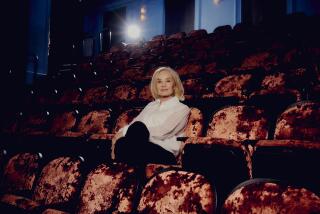Nudism’s Champion : Obituary: Services remember Elysium Fields’ longtime leader Ed Lange as a devoted advocate who played a key role in helping to change practitioners’ image as social lepers.
- Share via
During three decades, Ed Lange published and distributed enough nudist literature to become wealthy.
But the man who played a key role in altering the image of nudists as social lepers--and who died May 7 at age 75--chose to live a simple life, savoring and protecting his beloved Elysium Fields nudist camp in Topanga.
“This is where Ed always wanted to be,” said Dana Lange Newman, 35, her father’s handpicked successor to head the nudist magazine and book-publishing empire he founded.
In accord with his wishes, Newman also becomes executive director of the nonprofit Elysium Institute, which operates the renowned Topanga nudist Shangri-La.
She and her sister, Lisa Lange, and their mother, June Schwartz, from whom Lange was long divorced although they remained close, were among those who paid their respects to the nudist leader in a memorial service at Elysium on Sunday.
Lange died in a Reno hospital after a four-year struggle with prostate cancer. He had gone to Reno to be near Newman and her husband, who is a physician there.
The event drew about 300 guests, from old-timers who were part of Lange’s struggle to bring respectability to nudism to children too young to know what the controversy was about.
Lange may have done more than anyone to help bring nudism in the United States out of the shadows as a lifestyle.
Once regarded as nut-eating, berry-chewing, exercise fanatics--outsiders often called their gathering places “colonies”--nudists have traditionally tended to be socially conservative or even prudish.
Lange set out to change what he called nudism’s “puritanical streak” when he and his former wife formed the Sundial Club, a social group, in the early 1950s, running it out of their Hollywood apartment.
He fought numerous legal battles, including one that led to a 1956 U.S. Supreme Court decision granting second-class mailing privileges to nudist publications.
In the late 1950s, he persuaded Eastman Kodak to change its policy of refusing to return prints of nudes that were sent for developing. Later, he successfully bucked the publishers of Look magazine after they took exception to the name of one of his magazines--Nude Look.
*
He even scandalized daytime TV viewers in the early 1960s by appearing--fully clothed--on “Art Linkletter’s House Party” to promote the lifestyle.
“Ed was an original in more ways than one,” said George Paul, who met Lange in 1945 and was among an early group of nudist volleyball players Lange organized.
With the opening of Elysium Fields in 1968, traditional nudist sensitivities were put to an even sterner test.
Elysium allowed touching, frowned upon at other camps. Professional masseurs, unheard of in the nudist world at the time, were added to the staff. And Elysium was designated as “clothing optional,” a departure from camps that required guests to disrobe.
Yet, unlike Sandstone--the freewheeling sex commune above Topanga that ignited the imaginations of the counterculture and the general public alike during the 1960s--Elysium was fashioned by Lange as a place for families, espousing a “nude is not lewd” philosophy. He forbade sex on the grounds.
Lange became fascinated with nudism as a teen-ager, when he bought an early nudist magazine, Sunshine & Health, under the counter at a Chicago drugstore. Today, one of the companies he founded is that magazine’s chief distributor.
He abandoned Chicago and his strict Baptist upbringing and moved to Los Angeles in 1940, finding work as a set designer and free-lance photographer for Life, Vogue and Harper’s Bazaar.
Lange renewed his interest in nudism just when Lura Glassey, one of the movement’s pioneer West Coast leaders, came under attack.
Besieged by hostile newspaper accounts of alleged lewd behavior, Glassey was arrested. As her case languished in court, she was forced to sell her popular Elysia nudist park in the hills above Tujunga in the San Fernando Valley.
“It made me angry,” said Lange, in a 1994 interview. “From that point on, my dream was to someday open my own camp and do something to improve conditions for nudists.”
He created Elysium Fields as an oasis of tranquillity where the two most common status symbols--clothes and cars--have no currency. But the camp quickly became the target of a hostile Los Angeles County government.
Sheriff’s deputies arrested Lange and two dozen other nudists on successive weekends in 1968, charging them with indecent exposure under a 29-year-old county law.
After Lange waged a successful legal battle to overturn the law, the county used zoning changes in an attempt to drum Elysium out of business. When that tactic also failed, county supervisors asserted that the property was seismically unsafe to accommodate visitors.
Not until 1993, after a series of court reversals, did the county finally recognize the camp’s right to exist.
Once shunned by local business leaders, in recent years Lange served as the head of the Topanga Chamber of Commerce. In 1994 he was named the group’s “Man of the Year.”
Friends and family said that Lange spent more than $1 million in the long legal fight for Elysium, funneling profits from his publishing and mail-order businesses into improvements there.
Although he could have afforded to build a large home anywhere, Lange chose to live in a house overlooking the eucalyptus-scented grounds.
“That’s just who my father was,” Newman said. “He was a modest man whose orientation was more spiritual than material.”
Noting that Lange’s passing was observed by Time magazine, Newman added, “My dad would have been both proud and embarrassed by that. . . . He would have said, ‘What’s the fuss?’ ”
More to Read
Sign up for Essential California
The most important California stories and recommendations in your inbox every morning.
You may occasionally receive promotional content from the Los Angeles Times.










